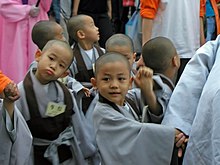Samanera
This article needs additional citations for verification. (November 2013) |
| People of the Pāli Canon | ||||||||||||||||||||||||||||||||
|---|---|---|---|---|---|---|---|---|---|---|---|---|---|---|---|---|---|---|---|---|---|---|---|---|---|---|---|---|---|---|---|---|
|
||||||||||||||||||||||||||||||||


A śrāmaṇera (Sanskrit; Template:Lang-pi; traditional Chinese: 沙彌; ; pinyin: shāmí; Korean: 사미. Tibetan: དགེ་ཚུལ་ getsül; Template:Lang-my shin thamanei, Template:Lang-th, Template:Lang-km, Template:Lang-vi) is a novice male monastic in a Buddhist context. A female novitiate is a śrāmaṇerī or śrāmaṇerikā (Template:Lang-pi).
Etymology
The literal meaning of śrāmaṇera is "small renunciate", and in Buddhism refers to someone who has taken the initial pravrajya vows but not the upasampada or full ordination. The prātimokṣa rules do not apply to them and they do not take part in the recital of the rules on uposatha days.
History
The account is that when Gautama Buddha's son Rāhula was seven years old, he followed the Buddha, saying "Give me my inheritance." The Buddha called Sariputta and asked him to ordain Rāhula, who became the first sāmaṇera.
The King (Suddhodana), discovering that now his grandson and a number of young men in the royal family had requested ordination, asked the Buddha only to ordain a minor with the consent of his parents or guardian. The Buddha assented. This rule was expanded to include the spouses of those intending to join the Order of monks and nuns".[1]
Overview
In the Vinaya or monastic discipline, a man under the age of 20 cannot ordain as a bhikṣu but can ordain as a śrāmaṇera. Śrāmaṇeras (and śrāmaṇerīs) keep the Ten Precepts as their code of behaviour and devote themselves to the religious life during breaks from secular schooling, or in conjunction with it if devoted to formal ordination.
The Ten Precepts upheld by śrāmaṇeras are:
- Refrain from killing living things.
- Refrain from stealing.
- Refrain from unchastity (sensuality, sexuality, lust).
- Refrain from lying.
- Refrain from taking intoxicants.
- Refrain from taking food at inappropriate times (after noon).
- Refrain from singing, dancing, playing music or attending entertainment programs (performances).
- Refrain from wearing perfume, cosmetics and garland (decorative accessories).
- Refrain from sitting on high chairs and sleeping on luxurious, soft beds.
- Refrain from accepting money.
Ordination differs between śrāmaṇeras and śrāmaṇerīs.
Transition to full ordination
After a year or at the age of 20, a śrāmaṇera will be considered for the upasampada or higher ordination as a bhikṣu. Some monasteries will require people who want to ordain as a monk to be a novice for a set period of time, as a period of preparation and familiarization. Adults would normally wear the white robes of a Brahmin.
See also
References
- ^ "Wall paintings ·· coming home, see section Buddha's son". buddhamind.info. Retrieved 2013-11-06.
